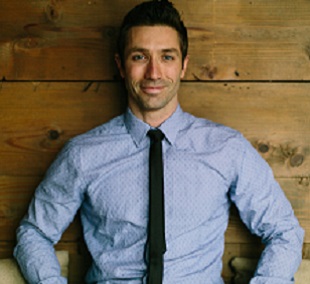He may not have a household name, but to thought leaders and entrepreneurs around the world, this man is a godsend. One thing’s certain: the world of webinars and video sales would be very different without him.
Casey Zeman.
When I sat down for my chat with him, I knew that he was a strong family man and a leader with vision. I knew that he was extraordinarily kind.
What I didn’t know was just how far he was from the world of online business just ten years ago. I didn’t know that a simple decision saved everything about his life, from the home he lived in, to the family he was building.
Despite his busy schedule and the five-week vacation he is on with his family in Michigan, Zeman has agreed to sit with me and share the true story of how he started a company that saved his world.
It was the great recession of 2008. Zeman ventured into the cosmos of the worldwide web to hunt for a better way to bring in leads for his real estate company. He had been in real estate for some time by this point, working as a mortgage broker surrounded by the shady deals happening before and throughout the recession. “Everything went downhill fast,” he says. “I went from a six-figure job to making $15,000 the very next year.”
He almost lost his house, and then, he almost lost it again.
“I was desperately trying to figure out how to get leads into a real estate company during a time when no one was able to get real estate off the ground.”
I was also in real estate throughout the recession, so I assure him that I know the struggle.
Zeman was led to YouTube. “I was immediately attracted to it because it was video; a way to bridge the gap of impersonality found on the web; a virtual handshake, a connector.”
By way of this interest, Zeman began learning more about it and became a YouTube consultant. “It was the only way I was able to make money,” he says. “Real estate just wasn’t doing it.” By 2011, armed with this new skill, Zeman was hustling for clients as a consultant.
Lest we forget, this happened in the ancient years of internet marketing, over a decade ago (which might as well have been a lifetime ago) when there were no specialists such as video marketers. There were no sales funnels and no online sales optimizers.
So Zeman began to work with anyone who could hire him, starting with a flash mob company, which led him to Estée Lauder and Harper Collins.
Meanwhile, Zeman’s house was still teetering on the edge of default.
“I kept trying to hold off,” he says. “Instead of short-selling or going into foreclosure, I bought time to modify the loan while going through the changes in my business.”
The back-and-forth process with the bank took two years, but by 2011, time was up. As hard as he was working, Zeman wasn’t bringing in enough income, and not enough income isn’t sustainable for a lifestyle in Los Angeles.
While time was ticking on his decision, Zeman’s wife, Diana, was teaching pilates and getting ready to open her own studio in Los Angeles. Sensing the struggle, I ask about his marriage at the time. Was it hard on you guys?
“Yes,” he says.
“If you can get through financial hardship with your spouse, you can get through damn near anything. She believed in me from that place of nothing. She also believed that we could keep our house and that became my commitment to her. That’s the drive that pushed me to find a way out. I told her I would take care of it. I told her we were going to keep the house.”
Desperate for something to succeed, Zeman began building an online course called YouTube Revealed. It took him six months to build.
“It was a super robust, wonderful course,” he says, “but as soon as I launched it, I couldn’t sell it. I didn’t know how to sell it.”
Leads were easy. He could get his leads through YouTube. But what about conversions? He didn’t have a tool to convert the lead into a sale.
“I heard about this thing called a webinar that people were doing and they were these cool, live experiences. I thought, okay, but I was really nervous about actually doing it.”
Regardless, he decided to try it. “I put it out there and people actually started signing up for this webinar I’d never done before. I was—terrible at it.” Zeman was a stutterer and considered himself especially bad at webinars. “Because I was paranoid about it, I just wanted to provide value, so I’d overshare. I’d give, give, give. I didn’t even sell anything for the first month of my webinars. I just did value-based webinars to build my email list.”
But then people started asking, “Hey, is there something we can buy? This is great, but how can we learn more?”
Zeman realized it was a disservice to people if he wasn’t positioning himself to sell a product of high value to them, so he decided to start selling.
“My first experience on a webinar where I pitched at the end was at my wife’s parents’ farmhouse in Iowa, in a little, back trailer in the dead of winter. I was using a busted-up PC and microphone. Even the internet was intermittent. Plus, a heater blared the whole time in the background.”
Nowadays Zeman has a studio that looks like mission control with multiple screens and an HD camera. But back then, he had nothing.
“I knew nothing about how to price things, so I priced that first program at $197.”
The value Zeman had given to people up front really paid off. Many of the free webinar attendees had asked about being affiliates, so 200 people showed up to the paid webinar in the Iowan trailer. After two-and-a-half hours speaking to the participants, Zeman sold $2000 worth of product.
I can sense the script’s about to change.
Even though Zeman now knows that he could have successfully added a zero onto the price of his first offer, and even though he wasn’t a great speaker and didn’t have a good setup for selling online, he was still able to generate revenue because he had inherently developed the know, like, trust and authenticity components of a good webinar.
“I think because I overshared, I was more genuine with people and they resonated with that.”
Later that year, Zeman upped his pricing to $297, which decreased his refunds. Then, he added a 30-minute call into his original program, increased it to $997, and remarkably sold the same number of units. “Even fewer refunds,” he says.
In that first year of selling on his webinar, Zeman built an email list of 14,000 people and sold $245,000 worth of his course.
The script has flipped.
The webinar saved the Zemans’ home. “That’s when I knew I liked webinars,” he says. “I found something that actually worked.”
Fast-forward two years, three years, seven years. Casey Zeman has built a platform that creates webinars at scale for thought leaders, entrepreneurs, authors, stay-at-home moms and dads, and marketers all over the world. He’s taken the complexity of online selling and webinars out of the question and created a simple platform, Easy Webinar, that can stream webinars onto multiple social media channels simultaneously and host automated, evergreen webinars with a built-in sales platform. In 2015, their launch year, they brought in $1 million dollars in sales, and now thought leaders like Amy Porterfield, Bob Proctor and Jay Shetty are using the platform.
But Zeman’s greatest success surrounds his personal life.
In 2016, Zeman and his wife traveled to Haiti to begin the process of adopting two children, a dream very close to their hearts, but also, a dream that wouldn’t have come true had their lives not been drastically transformed.
Over the next three years, they would travel to Haiti a total of 16 times.
“It was one of the hardest battles of my life. It’s difficult going through the process of adoption in a corrupt country where you’re told that you’ll have to wait all day at the embassy with your kids sitting on your lap in 90-degree-weather and no food, and then, psych! You have to do that over and over again. It taught me humility. It taught me perspective.”
In March of 2018, after intense struggle and years of waiting, Zeman brought their children home. In the meantime, the Zemans had gone through a pregnancy and the birth of another member into the family, rapidly swelling their family of two into a bustling family of five.
And, once again, the webinar saved them.
“Having automated systems in place to keep the business running during that time was a very needed thing because I was away from the business, battling to try to get my kids home,” says Zeman, “I would travel back and forth to Haiti in that period of time and the system I created allowed me to have the flexible lifestyle I needed.”
“It allowed me to not only save my house and my marriage, but also, bring my children home from Haiti.”
Yes, I say, but I’m leaning closer and seeing a deeper reason. I see a do-or-die resolve; that moment when Casey Zeman decided that he wasn’t scared of doing something outside his experience, when he didn’t wait to be good at speaking before trying a webinar, and was willing to travel to Central America no less than sixteen times to battle for his children.
It was his courage.
He will never say that, of course, so I will.
It’s the real reason Casey Zeman was able to save his marriage and his home. It’s why he was able to make a business and a life for the family he has today.


